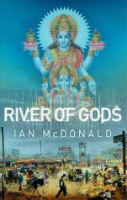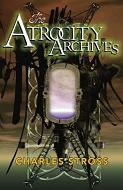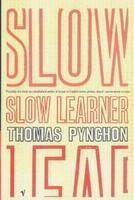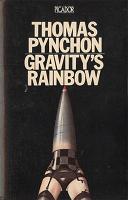 River of Gods by Ian McDonald is a book I read, firstly, ways too late; and secondly out of sequence: whilst it is not exactly part of a series it comes with a series of short stories, published after the book, and collated in a separate volume titled Cyberabad Days. Which I read first...
River of Gods by Ian McDonald is a book I read, firstly, ways too late; and secondly out of sequence: whilst it is not exactly part of a series it comes with a series of short stories, published after the book, and collated in a separate volume titled Cyberabad Days. Which I read first...
Though, I’m not sure this was all that wrong. Cyberabad Days introduces a lot of the setting, tech, and societal structures and changes which River of Gods plays within/against, without being directly connected to the actual story told in the novel. I guess this actually helped me to get into the story being told much easier, with easier access to concepts and less recourse to the helpful glossary of Hindu terms at the back of the book.
So, a simple message up front: I can recommend that you read both. And I can recommend that you read Cyberabad Days first – it definitely worked for me!
New Varanasi runs into Old Kashi in a series of discontinuities and juxtapositions. Streets begin in one millennium and end in another. Vertiginous corporate spires lean over shambles of alleys and wooden houses unchanged in four centuries. Metro viaducts and elevated expressways squeeze past the sandstone linga of decaying temples.
River of Gods plays in a near-future India, set in the late 2040s. India has fallen apart into a number of independent states; the focus is on three of those, aligned along the Ganges: Awadh, Bharat (main setting), and Bengal. The monsoon has failed to arrive for 3 years in a row now, water is scarce and getting scarcer, and Awadh has built a damn upriver to their own benefit, which, for reasons obvious, turns in a major political sticking point. Meanwhile the Bengalis are pulling a major iceberg into the Bay of Bengal, in an attempt to engineer a reversal in the local climate…
One of the dominating points in the society of this future India is the result of today’s gender politics, with its preference for sons (which, even in the book, still continues to some extent). There are now 4 eligible bachelors for every woman. The females marry up in the Caste System (as abandoned then as it is today), and the males pay, in effect, dowry. This also means that very few women make actual careers, as there is a huge surplus of (single) males requiring jobs, whilst the women are being kept, treasured, and sometimes forgotten as a intellectual force.
The other key development in this world is the development, step by step of AI (aeais, these new actors facilitation human/computer interaction are called); and the limits the world, under pressure from the Americans and their Hamilton Acts, have placed on their level of development, awareness, and independent ability to act. Bharat is a enclave which has not signed the acts, but has limited, in its own interest (who wants to be invaded by the Americans?) the aeai levels allowed, stretching a bit above the rest of the world to facilitate it’s virtual mega-soap, Town & Country. Still, there are Krishna Cops (shorthand for Artificial Intelligence Licensing Investigations Officers) who hunt down and terminate illegal and too advanced aeais and the stables that ‘breed’ them.
We are all programmed ghosts running on the distributed network of Brahma.
Besides aeai there are some other interesting technological developments – the ISS now has a centrifuge wheel, the world is getting very close to a breakthrough to infinite ‘Zero Point’ energy sources, children can now be genetically programmed for genius level intelligence, no degenerative diseases, and double life span (known as ‘Brahmins’ in this world). And surgeons have create a 3rd, neutral sex in humans (major, elective surgery), called Nutes (personal pronoun ‘yt’). Not all parts of society were ready for this, or welcome it…
McDonald spends the 1st of four parts of the book introducing threads, set pieces, each with its own chapter, telling a little back-story. Nearly all chapters are named after their main protagonist, and there is no shortage of those, Indian as well as foreign ones. The number of threads can be bewildering, even if the author quite quickly establishes touch points between at least some of the threads; but this is not a simple story, it’s a tapestry painting a picture.
Both the setting and the language are also a tapestry of amazing and absorbing creations. I marvelled at some of the descriptions, and ways things had been wrapped both into a historic framework for a society steeped in religion in their daily life, as well as the near-future setting thereof.
Apologies if I’m gushing – just take it from me that I think this to be great stuff, and that you should read it too, ok?
The book won a BSFA award, and was also shortlisted for the Arthur C. Clarke Award and the Hugo Award. Go get your copy now (and one of Cyberabad Days, to get you started on the setting!)
Title: River of Gods
Author: Ian McDonald
Reviewer: Markus
Reviewer URL: http://thierstein.net
Publisher: Simon & Schuster
Publisher URL: http://www.simonsays.co.uk
Publication Date: 2004
Review Date: 130322
ISBN: 0743256697
Pages: 588
Format: Hardback
Topic: SF
Topic: AI













